V S Achuthanandan, 92. M Karunanidhi, 91. What makes the oldest candidates in fray in Kerala and Tamil Nadu the most sought-after by their parties? Shaju Philip & Arun Janardhanan find out
Addressing an election rally in Assam last month, Prime Minister Narendra Modi dismissed the competition posed by Congress Chief Minister Tarun Gogoi, saying “he is so senior to me and, in a few years, he will be 90″. Gogoi is 81.
In two corresponding elections, there are two 90-plus contenders whom no one can dismiss in a hurry. If V S Achuthanandan is spearheading the CPM comeback campaign in Kerala, M Karunanidhi is doing the same for the DMK in neighbouring Tamil Nadu.
This is Achuthanandan’s eighth Assembly election. He first contested 49 years ago, in 1967, from Ambalapuzha. In all this time, he has been chief minister just once, though few may be able to stop him should the CPM win on May 19.
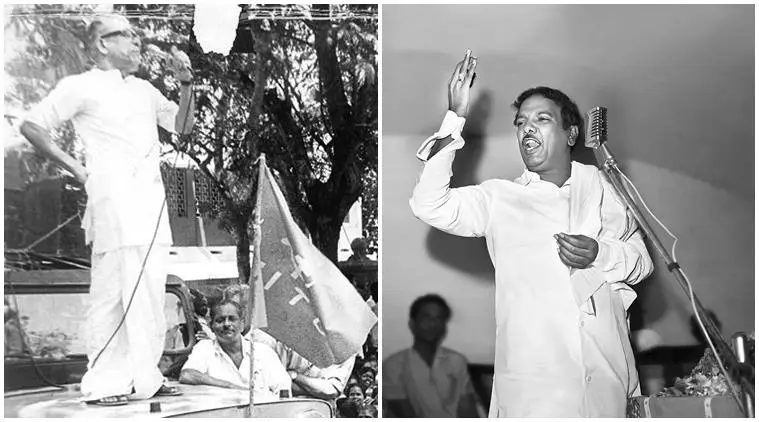 V S Achuthanandan (Photo courtesy: Mathrubhumi) and M Karunanidhi
V S Achuthanandan (Photo courtesy: Mathrubhumi) and M Karunanidhi
Karunanidhi is fighting his 13th Assembly election. He has not been defeated once in nearly 60 years of contesting polls, having begun from Kulitalai in 1957, and has been the CM five times. He has also been a member of the (now-abolished) Tamil Nadu Legislative Council once.

Achuthanandan is now the only surviving leader among the founders of the CPM. Both VS and Karunanidhi are the oldest candidates in the fray in the two states.
Here’s something more to put that in perspective: in the year 1957, when Karunanidhi won his first polls, Feroze Gandhi won from the Rae Bareli Lok Sabha seat. 1967, when VS contested the first time, was the year the Congress fought its first general elections without Jawaharlal Nehru at the helm.
V S Achuthanandan: Strict regimen, controlled diet, unsheathed ambition
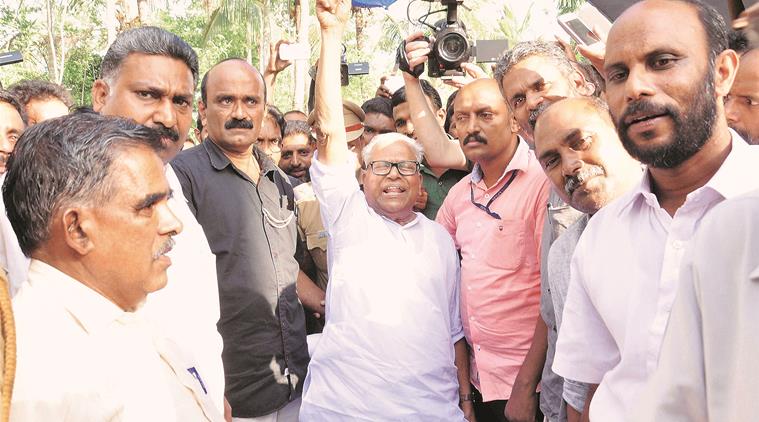 Wayanad: VS Achuthanandan arrives to visit the drought hit areas at Pulappalli in Wayanad on Friday. PTI Photo
Wayanad: VS Achuthanandan arrives to visit the drought hit areas at Pulappalli in Wayanad on Friday. PTI Photo
At 7.45 am, the government rest-house in Palakkad is deserted, except for a police constable lazing in a chair near a room on the ground floor. Minutes later, an elderly man emerges from the room, his mundu folded above the knees. Escorted by an assistant, he carefully climbs down a small ramp to a courtyard.
Here, the crimson sun of Kerala politics, Velikkakath Sankaran Achuthanandan, stands facing the sun — eyes closed, lips pursed. After a few minutes, he turns around for his back to soak in the morning rays. About 10 minutes later, he returns to his room.
Achuthanandan, popularly known as VS, will turn 93 in October. Before the Assembly elections of 2011, VS, who was then chief minister, had been denied a seat by the CPM “on health grounds”. After widespread discontent among party workers and the public, the CPM gave in. That election battle was reckoned to be the 87-year-old’s last. Here we are, five years later, with VS a natural contender for the CM’s post.
Apart from being the Left Democratic Front candidate from Malampuzha constituency, the veteran is shouldering the LDF campaign across the state — proving once again his ability to reinforce his relevance. All this doesn’t come easy. VS begins his day at 5 am. By 6 am, he is out for his regular morning walk, dressed in track pants and a white T-shirt. While at his official residence in Thiruvananthapuram, he usually goes to the university stadium for a half-an-hour walk, but now that he is in Palakkad district for campaigning, he makes do with the tarred road near the rest-house. As VS walks, two aides keep a careful watch, with one of them showing the way with a torch. VS walks for about 50 metres, taking slow, measured steps, then turns around and walks back. His assistant Kunhikannan says he walks this way for nearly 20 minutes, without exchanging a word with his aides.
After the walk, VS rests in his room for a while. “This is when he reads the newspapers. He wants all the local Malayalam and English dailies on his table when he returns from his walk,” says Kunhikkannan, who has been with VS for four years. This is followed by a bath and a 20-minute-long yoga session. VS took to yoga 12 years ago and does his asanas without anyone’s help, says Kunhikkannan. It is after yoga that he soaks up the sun.
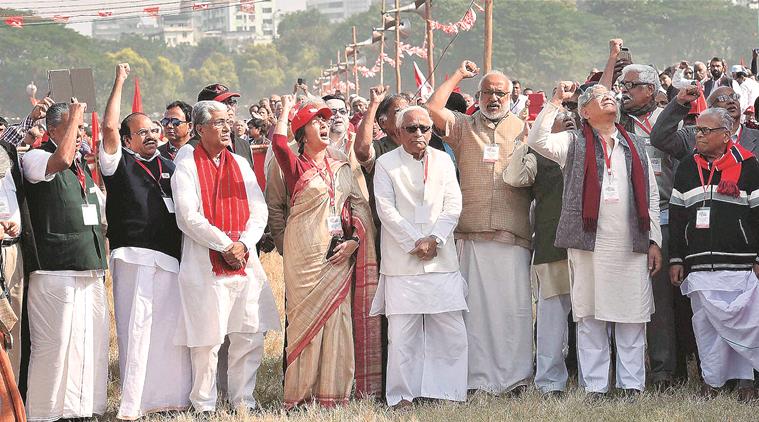 Kolkata: CPI(M) leader V S Achuthanandan, CPI(M) General Secy Sitaram Yechury, Former West Bengal Chief Minister Buddhadeb Bhattacharjee, Left Front Chairman Biman Bose Former Secretary Prakash Karat, State Opposition Leader Surya Kanta Mishra and others in an open rally during their Kolkata Plenum in Kolkata on Sunday. PTI Photo by Ashok Bhaumik
Kolkata: CPI(M) leader V S Achuthanandan, CPI(M) General Secy Sitaram Yechury, Former West Bengal Chief Minister Buddhadeb Bhattacharjee, Left Front Chairman Biman Bose Former Secretary Prakash Karat, State Opposition Leader Surya Kanta Mishra and others in an open rally during their Kolkata Plenum in Kolkata on Sunday. PTI Photo by Ashok Bhaumik
Breakfast comes next. His aides say VS flips through newspapers as he eats his usual “steam-baked puttu or idiyappam or appam”. VS’s fitness at 92 is attributed in part to his diet regimen: No tea or coffee for him; he only drinks hot water or tender coconut water. He has also largely stuck to vegetarian food, though he occasionally eats fish curry. A couple of years ago, VS famously broke this regimen when he went to greet estranged comrade, K R Gouri, on her birthday. Gouri is said to have chided him, “Since when have you turned vegetarian?”, and forced him to eat fish curry.
By 9 am, the veteran CPM leader is ready to receive visitors. Local leaders start trickling in, including A Prabhakaran, the LDF election committee convenor of Malampuzha constituency. Prabhakaran briefs him about the day’s schedule and tells him he will have to attend a few panchayat-level CPM conventions.
“I have been coordinating Achuthanandan’s election in Malampuzha since 2001. This time too he will win with a thumping majority,” says Prabhakaran. In 2011, VS had won by 20,017 votes against Congress candidate Lathika Subhash.
Half an hour later, VS is ready to leave for the first convention. Two assistants help him into a car, which sports the party flag on its bonnet. As he sinks into his seat, VS slips into the past: of those days without cars, with a lot of ground to be covered on foot. He started out as a strident labour union leader in Alappuzha who went on to become one of the most popular faces of the CPM in Kerala.
“I became a member of the Communist party in 1940, at the age of 17. I worked among fishermen, toddy-tappers and coconut climbers in Alappuzha. I later joined a coir factory, organised workers there and brought them closer to the Communist movement,” he says.
There were tough days. “In the early 1940s, I would stay in a house at Cherukara in Alappuzha for party work. The house was located in a paddy field with streams. I would walk kilometres along narrow ridges to reach workers. There were no bridges across these streams, only wooden planks,” he says. It was in the late 1950s, when he was district secretary of the united CPI in Alappuzha, that his office got its first car.
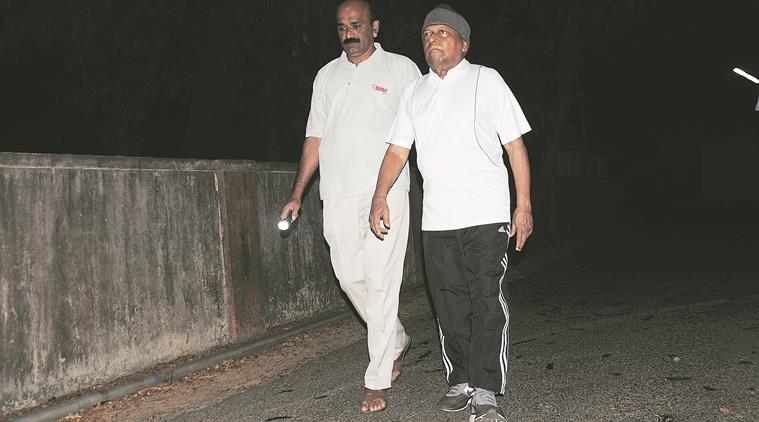
The VS motorcade reaches Kodumbu, 6 km from Palakkad city. The town is decorated with flags and festoons. Hundreds of party workers have gathered at the community hall to hear him. The hall erupts as party workers push to catch a glimpse of the veteran and shout slogans hailing him. VS has to jostle through the crowd to reach the stage, helped by his security guards. As mobile phones go up one by one to record his speech, the 92-year-old greets the audience with folded hands and starts speaking. With his voice ringing through the hall in his famous, much-mimicked style —halting and winding — the years fall away.
“We want to bring back the previous LDF government, which implemented several welfare initiatives,” says Achuthanandan. “You can realise my responsibility. I have to campaign across the state for LDF candidates, it is your duty to seek votes for Achuthanandan. Think of yourself as V S Achuthanandan when you go campaigning. Thank you, namaskaram.”
There is fresh sloganeering as VS makes his way back to his car. The next convention is at Mundur, half an hour away. At Mundur too, hundreds of party workers, including women, have been waiting for Achuthanandan. “Kanne Karale Viyesse (loosely translated to ‘Our eyes, our heart, oh VS’),” they shout as the CPM leader reaches.
Prabhakaran addresses the crowd here, and makes no effort to hide the ambition of the VS camp should he win. “People of Kerala are looking at VS with great expectation and enthusiasm. If an LDF government led by VS does not come to power, Kerala will collapse,” he says.
When it’s his turn to address the gathering, VS again tells the party workers to “go to the voters as VS” and garner votes for him. It’s midday by the time the event at Mundur is over, and VS returns to the guest-house in Palakkad for lunch.
“A few spoons of rice and vegetables make his lunch,” says son V A Arun Kumar. What he misses while he is out campaigning is the buttermilk made from goat milk that he has without fail while in Thiruvananthapuram. “He has a goat at his official residence in the capital,” says VS’s additional private secretary K V Sudhakaran.
After lunch, VS rests until 3 pm. He then meets visitors before leaving for a second round of campaigning in the evening.
Human rights activist Joy Kaitharam has brought along a few guests, including Lakshmi Bhai, the widow of P Satheendra Kumar, an employee of Malabar Cements who died under mysterious circumstances in 2013. The moment Kaitharam introduces Lakshmi to VS, he says, “Oh the Malabar cements case!’’ He promises Lakshmi her demand for a job for her son would be met if the LDF government came to power.
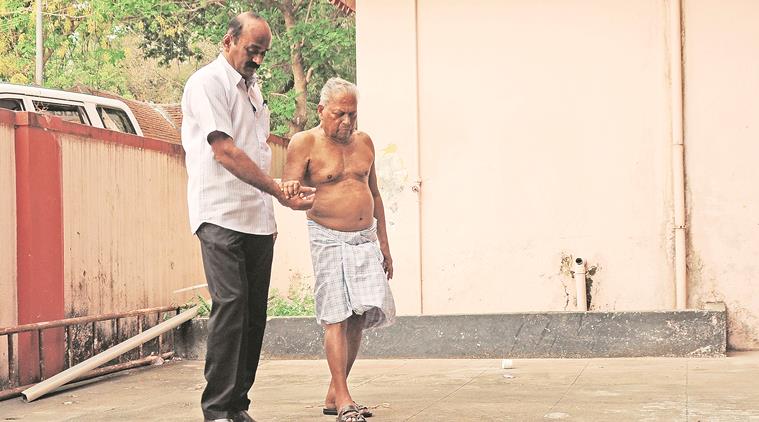
VS grasps things fast, Kaitharam smiles. “If we give written material, he gets the points in one reading.” A Suresh, the personal assistant for VS for 12 years, says the veteran’s popularity can be attributed to this quality and the causes he identifies himself with: “social evils, corruption, land encroachment and sex mafia”. “He patiently hears out everyone who meets him. VS is quick to grasp an issue and understand its gravity.”
CPM central committee member Thomas Issac underlines what VS means for the party. “People, particularly the poor, easily identify with him. There is a huge demand from the party and the public to include VS in as many campaigns as possible.”
Around 4 pm, VS leaves for two more meetings in his constituency, returning around 7.30 pm to the guest-house.
Before turning in for the night, VS again goes for a walk, this time for 30 minutes. “Even after a long journey or a busy schedule, he does not skip this routine. During the last Lok Sabha elections, he once stayed on the third floor of a hotel in Malappuram which did not have a lift. He would walk down the steps, come down for his evening walk and again take all those stairs on his way up,” says Sudhakaran, his additional private secretary.
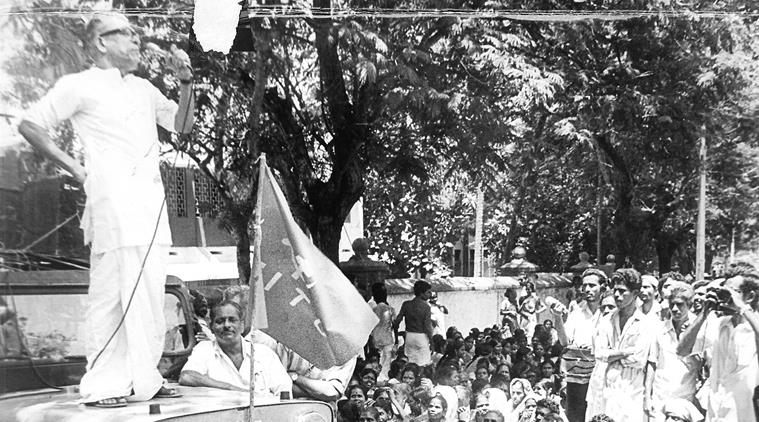
Dinner is light — a few pieces of papaya and three or four kadali bananas. Most days, he is in bed by 9 pm. Son Arun Kumar says VS usually never discusses politics with family. “Controversies do not upset him. His initial years of struggle have given him the strength to stay like a rock when political storms hit him.”
He is travelling with his father this time because of his age, Kumar adds. “I am here just to monitor his food.”
So what keeps him going at 92? VS, who since last fortnight has also joined social media, smiles, “I do my best to remain fit. I have a strict and disciplined life, just like my clean political life.”
The perpetual rebel
* Born on October 20, 1923, in Punnapra village in Alappuzha district, V S Achuthanandan lost his parents early. When 12, he dropped out of school and started working at his elder brother’s tailoring shop. He joined the Congress when he was 15, but became a CPI member two years later.
* In 1964, he was one of the 32 leaders to walk out of the national council of the CPI to form the CPI(M). He is the only one of the 32 still alive.
* VS’s biggest strength has been his ability to reinvent himself at crucial moments. As Opposition leader from 2001 to 2006, he associated himself with issues such as women’s empowerment, Dalit rights and land encroachment, which sent his popularity soaring.
* Within the party though, he has been a perpetual rebel, locking horns with Pinarayi Vijayan over control of the state leadership. In 2007, VS and Vijayan were both suspended from the Politburo for some time.
* In 2015, the CPM passed a resolution against VS for his alleged anti-party activities. But his fortunes have since brightened. With the BJP joining hands with Hindu Ezhava leader Vellappally Natesan, VS as an Ezhava is even more important now.
M Karunanidhi: A family close by, some prayers next door
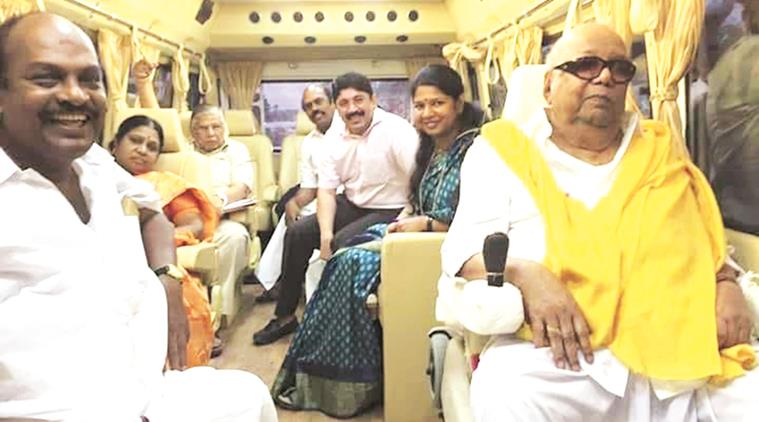 M Karunanidhi
M Karunanidhi
IT’S APRIL 23, three weeks to go for what is likely his final electoral battle, and M Karunanidhi is getting ready for his first poll rally. Inside the DMK chief’s two-storey house, made in the traditional Tamil style, distinctive only for the party flag atop, there is hectic activity.
Personal secretary K Shanmuganathan has been busy in the visitors’ section since 8.30 am. Another aide walks up and down with a phone, looking on as senior party leaders arrive and four armed commandos of the National Security Guard take positions. A sniffer dog checks Karunanidhi’s customised Toyota Alphard standing in the lobby.
A dozen security personnel conduct a routine drill, checking each vehicle parked on the street with metal detectors.
In his trademark safari suit, Karunanidhi’s aide Shanmughanathan, who has been with the DMK chief since 1976, is turning away people seeking appointments. Others can be seen decorating the door leading to his inner house with garlands, but the freshly drawn kolam (rangoli) in front of No. 15, 4th Street, Gopalapuram, has already been smudged by the people walking in and out.
As media cameras wait restlessly outside for Kalaignar, as Karunanidhi is fondly called by his followers, to emerge, news comes that the DMK chief is still having his favourite breakfast — dosa and chutney.
Information about what the 92-year-old eats though is tough to come by. It requires a formal mail before a close aide reveals, “Minimum four coffees a day is a must. By around 11 am, he will have chicken soup or vegetable soup, before a mini-lunch. He eats a little rice for lunch. Though there are some restrictions these days, gulab jamun and cutlets are his favourites.”
Around 9.30 am, eldest daughter Selvi is the first to step out, her hands full of flowers. Next to Karunanidhi’s house, in a narrow lane, is a temple. Rivals say the famously atheist leader’s family conducts pujas there. His loyalists insist Karunanidhi stops for no one, not even god.
That’s saying much for a leader confined to a wheelchair since 2009, and carrying the weight of his splintered party and family on his shoulders. Apart from the frugal meals, one way that keeps him going is daily yoga at 4 am, followed by the first coffee of the day. According to a close aide, he does all the possible sitting yoga postures he can for 20 minutes. The self-declared rationalist found the middle path when he embraced yoga in 2009.
“He started doing yoga after he was forced to give up his morning walk, which he would do mostly inside the sprawling compound of Anna Arivalayam, his party headquarters,” says the aide.
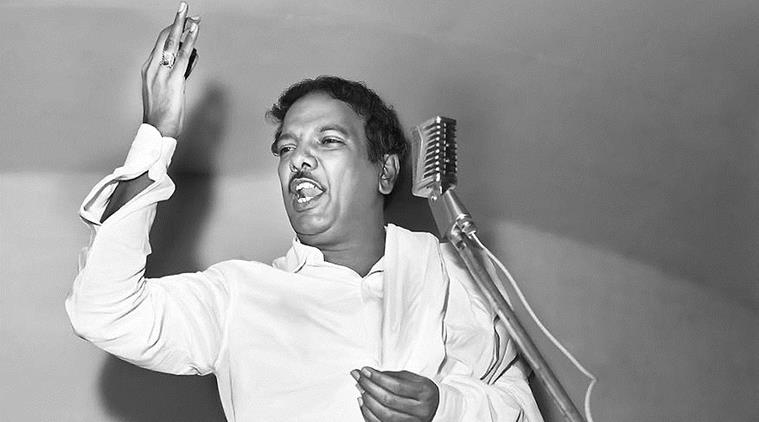
Karunanidhi finally leaves around 3 pm. He first stops at a CIT Nagar residence to pick up third wife Rajathi Ammal and daughter Kanimozhi before the convoy heads for a rally on the banks of Adyar, marking the start of a road trip that will cover half of the state’s districts and involve at least 35 rallies.
Since he can’t go to all the 234 constituencies, the party has planned for each rally to cover a dozen or more seats. Some of the rallies are stage events, at others, he would be delivering speeches sitting in his caravan. On the road though, he may not be able to indulge in the one leisure activity aides confess about him — watching old songs on TV, some of them from his films, others bound to be from bitter rival J Jayalalithaa’s.
His campaign van is a customised Force Traveller with a sliding door and a high roof, that can easily accommodate Karunanidhi’s wheelchair. He has been using similar vans for several elections now. Those who have seen and heard the Karunanidhi of old say the speech delivery is no longer as effortless, but it remains spontaneous, with the leader not referring to any paper during his 20-odd-minute addresses.
Instructing a youth who is part of the DMK social media team, Karunanidhi’s personal secretary Rajamanickam, who is well into his 70s, says the DMK chief knows just what to highlight from his speeches for YouTube and Facebook. Karunanidhi has had own Facebook and Twitter accounts since March 2014.
On a Monday evening, as Karunanidhi arrives for a rally at his Thiruvarur constituency, near native village Thirukkuvalai, there are over 10,000 cheering people gathered. The sight is reassuring for a leader who many have been saying should retire.
He starts his speech listing the names of Tamil Nadu Congress chief EVKS Elangovan sitting next to him, other alliance leaders and the DMK’s district leaders individually, triggering an applause each time. Rajathi Ammal sits behind him, while former Union telecom minister Dayanidhi Maran, who was named in the 2G scam, is to his left and never takes his eyes off the DMK supremo. The presence of both sends a message. In the war of supremacy within the Karunanidhi clan, it is Rajathi and Kanimozhi who are by the DMK chief in this campaign. Kanimozhi too carries 2G taint, and Dayanidhi is a surprise inclusion given his absence from public view for a long time.
Ignoring this fact, the DMK chief focuses on the alleged corruption of the Jayalalithaa government, talking about “money seizures” from her partymen’s houses and demanding a CBI probe.
If the presence of Kanimozhi is remarked upon, so is the curious absence of M K Stalin, while eldest son M K Alagiri is more or less silent now. Alagiri remains unpopular, and there is talk still among cadres and voters of him coming back if Karunanidhi returns to power. Others say how Stalin, who is running a virtual parallel campaign with professionals and a strong social media presence, should have been projected as the CM candidate by the DMK.
Older leaders close to Karunanidhi say some of his own relatives have asked him to hand over the baton to Stalin. However, says a close aide, Karunanidhi doesn’t want to be a father who made his son a CM. “He follows Mao’s theory — ‘I don’t want to support anyone, let them grow on their own’.”
READ: The Dravida Family Tree
Others point out that Karunanidhi still remains popular among colleagues, and for the reason that in a state with imperious leaders, surrounded by powerful coteries, he is open. “If I call him now and ask for an appointment, he would ask me to come immediately. That is Karunanidhi,” says Anbumani Ramadoss, leader of the PMK, and incidentally now a bitter rival.
Before the Trichy rally, the DMK men thronging outside his room are all carrying photographs of party leader K N Nehru. Partymen point out that unlike the AIADMK, the DMK also allows its second-level leaders to bloom.
Closest friend and advisor M Naganathan, former head of economics at the University of Madras and ex-vice chairman of the state planning commission, says his memories of Karunanidhi revolve around their morning walks together for almost 25 years, until he became wheel-chair bound.
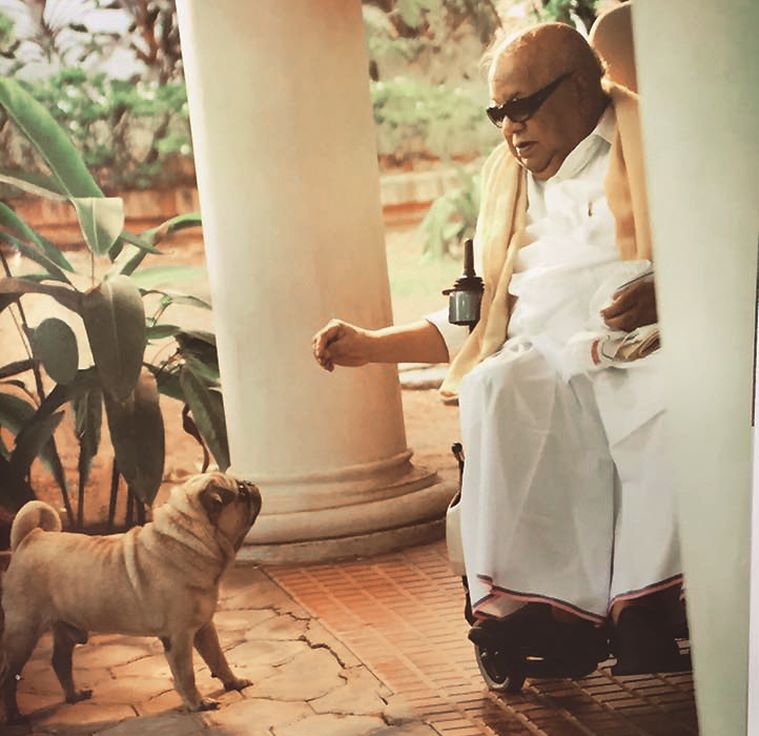
Naganathan also vouches that unlike Jayalalithaa’s actions against him — including sending police to arrest him at midnight in June 2001 — Karunanidhi never expresses any kind of venom towards her. “She is too junior to him, he has seen her since she entered the film industry as a child. When Kalaignar’s police went to arrest Jayalalithaa in 1996 (for alleged corruption), she kept them waiting for one-and-a-half hours. Karunanidhi asked the officers to arrest her only when she came out.”
Dismissing talk that Karunanidhi step down, an old-timer who meets the DMK chief off and on, says Stalin too bows before his father still. “Unless there is a constitutional framework imposing an age limit for leaders, it would be foolish to judge a leader by his age. Is V S Achuthanandan at 92 incompetent? Was Jyoti Basu a failure at 96? R Venkataraman was in his late 80s when he became the president of India.”
Still, even the leader of a party formed with a rationalist agenda can do with some prayers now. Four hours before the Trichy rally is to begin, a brief prayer is held at the hotel Karunanidhi is staying in. Party leader A Raja, another 2G scam survivor, is among the dozen or so leaders gathered as a priest holds prayers for Karunanidhi’s health.
Ask him about his contemporary Achuthanandan, and Karunanidhi is brief, “I wish him all the best for his success.”
The scriptwriter
* Muthuvel Karunanidhi was born on June 3, 1924, in Thirukkuvalai, a village near Thiruvarur. A school dropout, he was a screenwriter in the Tamil film industry before entering politics. The film circle in which he was active had political links with the Dravidian movement against Brahminism, and Karunanidhi was a founding member of the Dravida Munnetra Kazhagam (DMK).
* Along with C N Annadurai, he organised local protests against “powerful north Indian men imposing Hindi names” in 1953.
* He won his first election from Kulithalai in Trichy district in 1957, winning a seat in the Assembly of Madras Presidency.
* After the DMK parted ways with Periyar’s Dravidar Kazhagam (DK), won the elections in 1967 and Annadurai became the CM, Karunanidhi became public works minister. After Annadurai’s death in early 1969, Karunanidhi succeeded him till 1971. He returned to the CM’s office in the election in 1971.
* The DMK faced a vertical split in 1972 after MGR decided to float AIADMK following a tussle with with Karunanidhi. In five years, MGR captured power from DMK and ruled the state till 1987.
* He returned to power in 1989.









